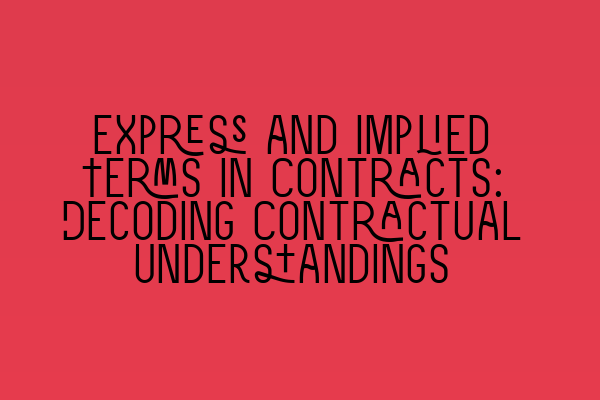Express and Implied Terms in Contracts: Decoding Contractual Understandings
Contracts are the backbone of any legal agreement. They define the rights and obligations of parties involved and provide the framework for a successful business relationship. Within these contracts lie the terms that outline the specifics of the agreement. These terms can be explicitly stated or inferred through the conduct of the parties.
Express Terms: Clear and Defined
Express terms are those explicitly stated in the contract, leaving no room for interpretation or ambiguity. These terms can be found in written or verbal form, as long as they are clearly communicated and agreed upon by all parties involved. The beauty of express terms is their precision and certainty, as they leave no room for misunderstanding or confusion.
For example, a contract for the sale of goods may explicitly state the quantity, price, and deadline for delivery. These terms are crucial in establishing the expectations and responsibilities of each party. Breach of an express term can lead to legal consequences, such as a claim for damages or even termination of the contract.
It is important to note that not all terms need to be expressly stated to be legally binding. Many terms can also be implied into a contract.
Implied Terms: Unspoken but Understood
Implied terms are those that are not expressly stated in the contract but are nonetheless understood to be included based on the nature of the agreement, industry customs, or statutory requirements.
There are two main types of implied terms:
- Terms Implied by Statute: These are terms that are automatically incorporated into certain types of contracts by virtue of legislation. For example, the Sale of Goods Act 1979 implies terms that the goods being sold are of satisfactory quality and fit for their intended purpose.
- Terms Implied by Common Law: These are terms that are implied into contracts based on legal principles established by courts over time. They are often considered necessary to give effect to the intentions of the parties. For example, the duty of care in a contract for services is implied by common law.
Implied terms fill in gaps in the contract and provide a foundation of understandings that parties must adhere to. They are not explicitly discussed but are assumed to be present in order to make the contract workable and fair.
Decoding Contractual Understandings
Understanding the terms, whether express or implied, is essential to deciphering contractual understandings. It is vital for all parties to be aware of the rights, obligations, and limitations set forth in the contract. Failure to do so may result in misunderstandings, disputes, and potential legal liabilities.
As a solicitor, it is your responsibility to ensure that your clients fully comprehend the terms of their contracts. This includes explaining both the express and implied terms and their implications. By doing so, you can help prevent future conflicts and provide your clients with the necessary knowledge to make informed decisions.
Furthermore, it is important to note that the courts take into consideration the intentions of the parties when interpreting contractual terms. It is not solely based on the literal meaning of the language used but also the context, industry practices, and previous dealings between the parties. This highlights the importance of being clear and precise when drafting contracts, as any ambiguity can lead to differing interpretations.
At SQE Contract Law, we understand the complexities of contracts and the significance of terms, whether express or implied. Our team of dedicated solicitors are well-versed in the intricacies of contract law and can provide expert advice and representation in all matters related to contract drafting, interpretation, and enforcement.
For additional resources on contract law and to prepare for the SQE exams, we recommend the following articles:
- SQE 1 Practice Exam Questions
- SQE 1 Practice Mocks FLK1 FLK2
- SQE 2 Preparation Courses
- SQE 1 Preparation Courses
- SRA SQE Exam Dates
Whether you need assistance with contract drafting, interpretation, or dispute resolution, SQE Contract Law is here to guide you through the intricacies of contract law. Contact our expert solicitors today to ensure the success of your business relationships and legal agreements.
